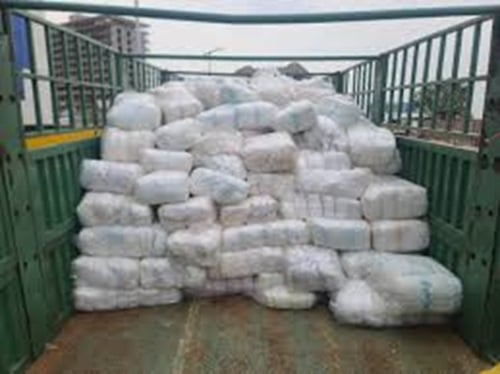The Consumer Protection Agency (CPA) in Ghana has issued a dire warning regarding the escalating health risks posed to infants by the proliferation of counterfeit and substandard baby diapers in the Ghanaian market. This alarming situation has resulted in numerous reported cases of infections, skin rashes, and sores among babies, raising serious concerns about the safety and well-being of these vulnerable individuals. The CPA’s investigation has revealed that these counterfeit diapers, often rejected in their countries of origin due to safety concerns, find their way into the Ghanaian market due to lax import regulations and the unscrupulous practices of some importers. The agency has initiated a crackdown, seizing these substandard products in the Greater Accra Region and planning to extend these efforts nationwide.
The widespread availability of these fake diapers represents a critical public health issue. Infants, with their delicate skin and developing immune systems, are particularly susceptible to the harmful effects of these substandard products. The infections, rashes, and sores caused by these diapers can cause significant discomfort and distress to babies, potentially leading to more severe health complications if left untreated. Moreover, the long-term effects of exposure to the chemicals and materials used in these counterfeit products are yet to be fully understood, raising concerns about the potential for chronic health problems in affected infants. The CPA’s warning underscores the urgency of addressing this issue to protect the health and well-being of Ghanaian children.
The CPA attributes the influx of these substandard products to a combination of factors, primarily pointing to unscrupulous importers who prioritize profit over safety and the inadequate enforcement of import regulations. These importers exploit loopholes in the system, taking advantage of weak regulatory oversight to introduce these hazardous products into the market. The lack of stringent quality control measures and inadequate monitoring of imported goods create an environment conducive to the proliferation of counterfeit products. Furthermore, the demand for affordable baby products, coupled with limited awareness among consumers about the dangers of counterfeit diapers, contributes to the problem. This situation highlights the urgent need for stricter import controls and enhanced regulatory oversight to prevent the entry and distribution of these dangerous products.
The CPA’s initial efforts to address this issue have focused on seizing counterfeit diapers in the Greater Accra Region. This action demonstrates the agency’s commitment to protecting consumers, particularly vulnerable infants, from the harmful effects of these substandard products. However, given the widespread nature of the problem, the CPA recognizes the need to expand its operations to other regions of the country. A comprehensive nationwide crackdown is crucial to effectively remove these dangerous products from the market and prevent further harm to infants. This will require increased resources, inter-agency collaboration, and a strengthened regulatory framework to effectively combat the influx of counterfeit diapers.
The CPA’s call for vigilance among parents and caregivers is crucial in addressing this issue. Educating consumers about the potential dangers of counterfeit diapers and providing them with the tools to identify these products is essential. Parents and caregivers should be encouraged to carefully examine diaper packaging for signs of tampering, inconsistencies in branding, and unusual textures or odors. Reporting suspicious products to the appropriate authorities is also crucial for facilitating swift action and preventing further distribution of these hazardous items. Public awareness campaigns, coupled with clear reporting mechanisms, can empower consumers to actively participate in protecting their children’s health.
Beyond the immediate actions of seizing counterfeit products and raising public awareness, the long-term solution lies in strengthening regulatory frameworks and enhancing enforcement mechanisms. The CPA’s efforts must be supported by robust legislation and stricter import regulations that effectively prevent the entry of substandard products into the Ghanaian market. Increased collaboration between regulatory agencies, including customs officials, health authorities, and consumer protection bodies, is essential for effective monitoring and enforcement. Furthermore, investing in testing and certification procedures for imported baby products can ensure that only safe and compliant products reach consumers. A comprehensive approach that combines regulatory reforms, enhanced enforcement, and public awareness campaigns is crucial for effectively addressing this public health crisis and safeguarding the well-being of Ghanaian infants.


